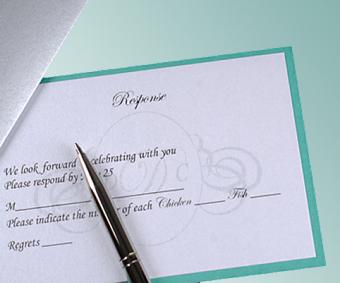
Wedding RSVP etiquette often feels like a gray area for some people, and issues arise when determining how to respond. This is especially true for someone unfamiliar with the correct social protocol. A few etiquette tips can quickly clear up any confusion.
Bride and Groom RSVP Wedding Etiquette
Etiquette starts with the couple when it comes to sending out invitations and expecting responses. It is also up to the couple to appropriately handle any issues that arise.
Length of Time for RSVPs
Invitations should reach your guests six to eight weeks prior to the wedding date. If you are hosting a destination wedding, where all of your guests have to travel, then you should send out save the date cards nine to 12 months before the wedding, but the invitations can still go out the six to eight weeks prior to the wedding. You can include a response date on your response cards, giving guests four to six weeks to respond to your invitation.
In other words, you can ask guests to let you know at least two weeks prior to the wedding whether they will attend, who will attend with them, and any entrée choices of the attendees.
Response Information
Compose RSVP wording that helps eliminate any potential etiquette issues before they arise. This includes providing a space on your response cards where guests can indicate the total number of attendees from their family. It leaves the guesswork out of determining if Mr. and Mrs. Joe Some are bringing their three children-Aaron, Nancy, and Joe Jr., or if they coming alone. On the same note, provide a line that asks for the names of each attendee, so guests can fill this information in for you.
It is appropriate to provide guests with a "plus one" invite if they are married, living with someone, or have been dating someone for a long time. Don't forget to add a line for this person's name on the RSVP as well.
Non-responder Issues
It is acceptable to contact invited guests if you do not hear from them by the response date. You can call them or have your fiancé call them, depending on whether they were on your guest list or his. Let them know that you are finalizing the details, want to make sure they received the invitation and need to know whether they plan to attend.
Jacqueline Whitmore, etiquette and protocol expert for over a decade, explains, "If time allows and there are a large number of non-responders, I would send an email or place a call to find out if they perhaps did not get their invitation in the mail. Then on the wedding day, rather than making a scene and possibly embarrassing the couple that did not RSVP, I would find them a seat. The good news is typically caterers will prepare about 10% more food than required so it should not be too much of a problem."
Managing Issues With Non-RSVPed Children
Even if children are not invited and are not included on the RSVP, some guests will still bring them. The best practice is to ignore it rather than to confront the guest or prohibit them from bringing their children into the ceremony or the reception.
According to Whitmore, "This happens more times than it should. Guests want to be part of the celebration and for whatever reason, do not secure someone to care for their children. A gentle way to deal with this situation should it happen to you, is to have the family sit at a table off to the side or back of the reception area. That way if the children are disruptive their parents can whisk them off quickly. In advance of the wedding (if you do not have an onsite wedding planner), I would ask a trusted friend or family member to run interference and handle this situation. The bride and groom should not have to handle the situation during their celebration."
RSVP Etiquette for Guests
As an invited wedding guest, you have some responsibility in how you manage the invitation to attend someone's wedding.
Send Timely Responses
You might receive an invitation, but the respond by date is not included. Whitmore explains the response time varies based on when the invitation is received.
- If it is received four weeks or more prior to the wedding, you should return the RSVP so that it is received three weeks before the nuptials.
- If the invitation is received less than four weeks prior to the wedding, the RSVP should be mailed within 48 hours of its receipt.
This gives the bride time to tally her numbers and entrée choices to provide the final attendee numbers to the caterer, cake creator, and other vendors.
How to Respond to Wedding RSVP Cards
Pay special attention to providing the bride with all of the details she needs. This includes providing the name of each attendee, so she knows precisely who is attending the wedding and any dinner options, if requested. However, a couple situations do arise when it comes to RSVPing appropriately.
Plus One RSVPs
You've received an invitation and it's addressed to you-solely. It doesn't have any other name on it and it doesn't say if you can bring a guest. You're dating someone new and you'd love to enter the room arm-in-arm. You wonder if you can RSVP for yourself and your significant other even if he or she wasn't mentioned on the invitation.
If the envelope is not addressed to you and a guest, then you're out of luck. It is also not appropriate to expect the bride to invite a man or woman you're newly dating. In this situation, don't RSVP for a plus one when she or he was not indicated on the original invitation.
RSVPing for Kids
According to Whitmore, if your children are invited to the wedding, this is indicated on the envelope as well. The outer envelope may only have you and your spouse's names. The inner envelope includes the individual names of the invited guests.
Some brides address the envelope to the family, "Smith Family." In these instances, you know that your children are invited. Whitmore explains that if you are unsure, it is perfectly acceptable to call and ask the host of the wedding, such as the bride's parents, if children are invited to the festivities. Whitmore goes on to say that a guest should never assume that children are invited to the wedding. It's best practice to inquire instead.
Overall Etiquette
In the end, the bride and groom and the invited guests share responsibility for RSVP etiquette. Couples should request as much information from guests as possible and guests should use common sense in responding in a timely manner and with the information the couple needs to appropriately plan for their big day.







